When it comes to city passes and travel cards, it’s usually fairly easy to figure out whether they would be worth it for you or not. For things like the Paris Pass or London Pass, they have a list of the most popular attractions and how much they cost, right there for you to see. The Swiss Travel Pass, however, is shrouded in mystery, or at least it was until I spent several days tracking down all of the prices and benefits.
A great many of the visitors and commenters on my popular page about where to go in Switzerland on a short visit are wondering whether the Swiss Travel Pass is a good deal. Embarrassingly, I’ve always had to answer that I found the pass too confusing to confidently advise people on. Now that has all changed, after literally days of research.
Note: This article was last updated in February, 2024.
Disclosure: This is a reader-supported website and some of the links are affiliate links where a small commission is paid to help keep this site going, but the cost to visitors is the same. The Swiss Travel Pass seems quite expensive at first, so it felt like it might be hard to get your money’s worth out of it. As it turns out, it’s pretty easy to get good value, and it’ll be a good deal for many visitors.
New in 2024
Prices increased an average of 5.9% from 2023 on the Swiss Travel Passes, but the Half Fare Card remains at CHF120, which is where it’s been for many years. Train fares in the country increased by similar percentages so the value is basically unchanged. There were no other notable changes to service or the included attractions and train routes.
>>>Buy the Swiss Travel Pass online
Where to stay in Interlaken and the Lauterbrunnen Valley
Since most people reading this will be visiting the Interlaken area and I get so many questions about it, I decided to write a detailed guide on which area to stay in while visiting this area.
>>>Where to stay in Interlaken or the Lauterbrunnen Valley in Switzerland
I included many huge photos in that post so readers will be able to get a better idea of what each place looks like and they are worth a look by itself.
>>>Lucerne or Interlaken: Which to visit and how long to stay?
The article just above will help you decide on how long to spend in each of Switzerland’s two best tourist areas.
Are you 100% sure where you want to go in Switzerland? This should help
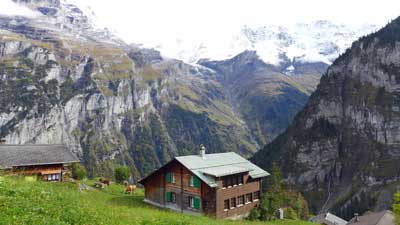
Zurich and Geneva are pleasant but dull. The good news is that Switzerland is packed with amazing sights and none of them are the big cities. If you aren’t 100% locked in yet, please read the article below and I think you’ll enjoy it.
Is the Swiss Travel Pass a good deal? Here's the short version

The bottom line is that the scenery, train journeys, and cable car rides in Switzerland are stunning and not found anywhere else in the world. They are also quite expensive if you pay for them one at a time. So no matter how you visit Switzerland, you are going to be paying quite a bit, or skipping the absolute best things that you’ve come there to see.
With good planning it’s quite easy to get great value out of a Swiss Travel Pass, but it might be a poor choice for those who don’t like to plan ahead. You can easily do a scenic train ride and a cable car in the same day, and still have time to do a scenic hike in the process.
First class or second class? Good news for most people
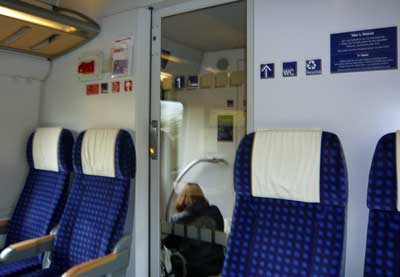
That said, Swiss Trains are literally the nicest in Europe and even the Second Class seats and carriages are nicer and roomier than trains in neighboring countries. The First Class seats are larger and nicer with only 3 across the cabin instead of 4, but honestly Second Class is perfectly comfortable for almost everyone.
Again, First Class on European trains like this is generally popular with business travelers where the company is paying and they need to get work done during the ride, and also senior citizens who don’t want to worry about a carriage full of backpackers. For most of the rest of us, Second Class is more than comfortable enough and the seat width and legroom compare to business-class airline seats. I’m a big and tall guy and I almost always travel in Second because it’s plenty comfortable enough and all the seats arrive at the same time anyway.
The longer you'll be in Switzerland, the better deal a Swiss Travel Pass will be
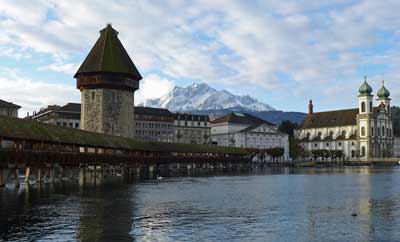
In other words, if you are staying 5 days or fewer, you have to do the math to determine your best option. But if you are spending even 6 or 7 days in Switzerland then the 6-day or 8-day Pass is almost guaranteed to be a great deal and your best choice. Once you have a Swiss Travel Pass you’ll absolutely love the ability to just hop on any train (excellent trains, always on time) and most boats and cable cars without having to worry about the cost. The per-day cost of an 8-day Pass even if you only use 6 of those days is about CHF65, and Switzerland is filled with amazing train rides and boats and cable cars that can get you that much value before noon each day.
Schilthorn (50% discount) and Jungfraujoch (25% discount) are cheaper with a Swiss Travel Pass
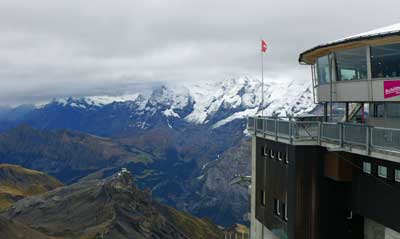
Both of those peak experiences are extraordinary and different from each other. Even so, compared to Jungfraujoch, Schilthorn is also faster and more comfortable on the way up and down. You can enjoy an excellent visit to Schilthorn in 4 hours or so (or a bit longer if you eat at the spinning Piz Gloria restaurant at the top), while a visit to Jungfraujoch requires closer to 6 hours.
NOTE: Schilthorn closes for maintenance for a week or two in late November most years.
Consider the Swiss Half-Fare Card instead
If you AREN’T going to be doing two or more of the long (and expensive) scenic train trips, you will get much better value out of the Swiss Half-Fare Card, which is explained a bit below.
Mt Rigi, near Lucerne, is 100% covered by the Swiss Travel Pass
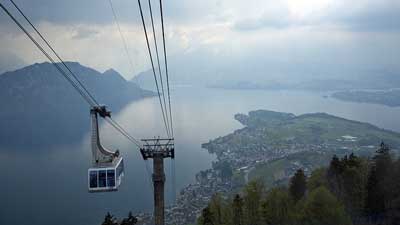
Is a Swiss Travel Pass right for you?
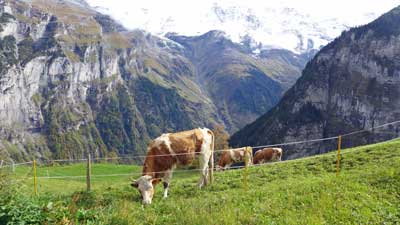
Most people only visit Switzerland for 5 or 6 days at most, so the 3-day and 4-day passes are the ones to focus on. But if you are staying for 8 days or more, those longer passes are almost certainly a great deal for you.
Long story short, if you plan on doing 2 of the more expensive scenic trains and the Jungfraujoch railway or the Schilthorn cable car, then the pass will save you money. Switzerland is expensive, but it’s worth it, and the travel pass can help make it a bit more affordable.
What the Swiss Travel Pass includes
- Free rail travel on normal trains and most scenic trains
- Discounted travel (about 50%) on popular tourist mountain trains
- Discounted travel (about 50%) on popular tourist cable cars
- Free travel on public transport in 75 towns and cities
- Free entry to around 500 museums in Switzerland
The Swiss Travel Pass covers the fare on the most popular scenic and panoramic trains. You can choose a normal seat in a regular carriage for no additional cost, but there is a supplement of CHF8 to CHF49 for a reserved seat in one of the special panorama carriages on these routes.
Prices of the 2024 Swiss Travel Pass
1st Class
- Adult 3-day Pass: CHF389
- Youth (4 to 25) 3-day Pass: 274
- Adult 4-day Pass: 469
- Youth (4 to 25) 4-day Pass: 330
- Adult 6-day Pass: 602
- Youth (4 to 25) 6-day Pass: 424
- Adult 8-day Pass: 655
- Youth (4 to 25) 8-day Pass: 469
- Adult 15-day Pass: 723
- Youth (4 to 25) 15-day Pass: 512
2nd Class
- Adult 3-day Pass: CHF244
- Youth (4 to 25) 3-day Pass: 172
- Adult 4-day Pass: 295
- Youth (16 to 25) 4-day Pass: 209
- Adult 6-day Pass: 379
- Youth (16 to 25) 6-day Pass: 268
- Adult 8-day Pass: 419
- Youth (16 to 25) 8-day Pass: 297
- Adult 15-day Pass: 459
- Youth (16 to 25) 15-day Pass: 328
Swiss Travel Pass Flex
This version costs a bit more, but you don’t have to use the travel days consecutively. It’s a great option for anyone who won’t be taking longer train rides each day.
- Adult 3 Flex days in 1 month (1st Class): CHF445
- Adult 3 Flex days in 1 month (2nd Class): 279
- Adult 4 Flex days in 1 month (1st Class): 539
- Adult 4 Flex days in 1 month (2nd Class): 339
- Adult 6 Flex days in 1 month (1st Class): 644
- Adult 6 Flex days in 1 month (2nd Class): 405
- Adult 8 Flex days in 1 month (1st Class): 697
- Adult 8 Flex days in 1 month (2nd Class): 439
- Adult 15 Flex days in 1 month (1st Class): 755
- Adult 15 Flex days in 1 month (2nd Class): 472
Where to buy the Swiss Travel Pass
The Swiss Half-Fare Card – A better option for many visitors
Far less confusing than the Swiss Travel Pass, you can instead get a Swiss Half-Fare Card, and it will be a better deal for many travelers. The price is lower and it’s much easier to do the math, and the discounts are greater on some things as well.
- Swiss Half-Fare Card for 30 days: Adults – CHF120 or US$129
What you get:
Those who buy the Swiss Half-Fare Card will get 50% discount on all trains, buses, and boats in Switzerland for up to 30 days, as well as 50% off all public transportation in 75 cities and towns.
>>>Buy the Swiss Half-Fare Card
Why the Half-Fare Card is a better deal for many
While the Swiss Travel Pass is a great deal for those doing many of the expensive scenic journeys and mountain sights within a few days, it’s not good value for those who are doing fewer of the expensive trips and/or those who are staying longer. Also, the Swiss Travel Pass only provides a 25% discount on the amazing Jungfraujoch Railway, which costs between CHF120 and CHF224 return depending on your starting point, while the Half-Fare Card provides a 50% discount.
The math is simple as well. You can just add up the cost of the trains, boats, and buses you’ll be taking while in Switzerland, and if the total is more than CHF240 or so, the Half-Fare Card will save you money.
Example itinerary:
- Zurich to Interlaken train (2nd Class): CHF50
- Schilthorn Cable Car: CHF112
- Jungfraujoch railway from Interlaken: CHF205
- Interlaken to Lucerne train (2nd Class): CHF33
- Mt Rigi roundtrip from Lucerne: CHF84
- Engelberg (near Lucerne) to Mt. Titlis Cable Car: CHF92
- Lucerne to Zurich train (2nd Class): CHF25
Total per person: CHF601
Total with Half-Fare Card (including price of card): CHF420.50
It would be tough to do all of those things in 4 days, although it is possible. If you bought a 4-day Swiss Travel Pass here is how it adds up:
4-Day Swiss Travel Pass: CHF259
Supplements for Schilthorn, Jungfraujoch, and Mt. Titlis: CHF203.25
Total cost: CHF462.25
Bottom line on the Swiss Half-Fare Card
Since the Half-Fare Card lasts 30 days and provides a larger discount on Jungfraujoch, it is better value for visitors who want to include that scenic top-of-Europe rail journey on their trip. The discounts also add up more quickly on Schilthorn and Mt. Titlis trips, just to name two examples, and you don’t have to take many longer rail journeys to get value out of the Half-Fare Card.
Swiss Saver Day Pass (A one-day unlimited travel pass)
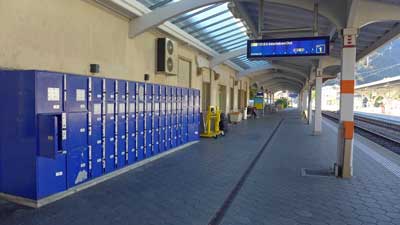
If you buy the Saver Day Pass at least 21 days in advance (and up to 60 days in advance) the 2023 cost is:
- 2nd Class (with Half Fare Card): CHF29
- 1st Class (with Half Fare Card): CHF82
- 2nd Class (with no Half Fare Card): CHF52
- 1st Class (with no Half Fare Card): CHF97
Once you research the normal cost of Swiss train fares you’ll see that the above prices are a very good deal for anyone riding more than 150 kilometers or so in a day. If you are just going, for example, from Zurich to Lucerne or Interlaken on a day, it’ll be cheaper to just buy that ticket individually. But if you are going from Geneva or Montreux to Interlaken or Lucerne then the Saver Day Pass will be much cheaper. Better still, you can use a Saver Day Pass to go from Interlaken to Geneva and back on the same day on the Goldenpass line and returning on the faster train through Bern, and it will still all be included for free.
If you don’t buy a Saver Day Pass at least 14 days in advance it’s more expensive, and if you only buy 1 to 3 days in advance it’s VERY expensive, so the key is to buy early. This is all confusing, but the Saver Day Pass should be a great option for many people only in Switzerland for one to three days.
Popular Swiss panorama scenic trains
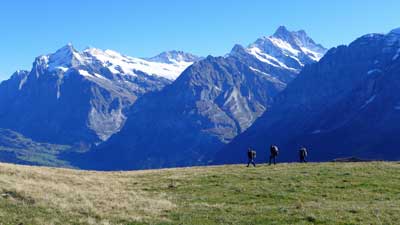
- Glacier Express
- Route: Zermatt to St. Moritz
- Train type: Panorama
- Journey time: 8 hours 3 minutes
- Distance: 291km
- 1st Class fare: CHF272
- 2nd Class fare: CHF159
- Compulsory seat reservation fee: CHF44 or 49
- Supplement for Swiss Pass holders: 13 to 33 for panorama carriage
- Bernina Express
- Route: Chur to Tirano and Lugano
- Train type: Panorama and bus
- Journey time: 4 hours 13 minutes and 3 hours 10 minutes
- Distance: 148km and 90km
- 1st Class fare: CHF113
- 2nd Class fare: CHF66
- Compulsory seat reservation fee: CHF32
- Supplement for Swiss Pass holders: 10 to 14 for panorama carriage
- GoldenPass Line
- Route: Lucerne to Montreaux
- Train type: Panorama
- Journey time: 5 hours 8 minutes
- Distance: 191 km
- Prestige Class fare: CHF131
- 1st Class fare: CHF96
- 2nd Class fare: CHF56
- Supplement for Swiss Pass holders: 8 to 15 for panorama carriage
- Gotthard Panorama Express (formerly Wilhelm Tell Express)
- Route: Lugano or Locarno to Lucerne
- Train type: Panorama and boat
- Journey time: 5 hours 21 minutes
- Distance: 182 km
- 1st Class fare: CHF164
- 2nd Class fare: CHF135
- Supplement for Swiss Pass holders: 39 to 49 for panorama carriage
- Swiss Chocolate Train
- Route: Montreux to Broc round trip
- Train type: Panorama or First Class
- Journey time: X hours X minutes
- Distance: 82 km
- 1st Class fare: CHF99
- 2nd Class fare: 89
- Supplement for Swiss Pass holders: 39
Popular Swiss scenic and theme trains
The scenic trains below are also extremely popular as sightseeing journeys rather than just as transportation, but can be used as both.
- Jungfraujoch round trip
- Route: Interlaken to Jungfraujoch
- Train type: special mountain train
- Journey time: 4 hours 41 minutes, round trip, plus time on top
- Distance: 73 km
- 1st Class fare: N/A
- 2nd Class fare: CHF224
- Supplement for Swiss Pass holders: 147 (so, a saving of CHF77)
- Gornergrat Railway
- Route: Gornergrat Railway
- Train type: Cog railway
- Journey time: 44 minutes return
- Distance: 10 km
- 1st Class fare: N/A
- 2nd Class fare: CHF90
- Supplement for Swiss Pass holders: 45
- Rigi round trip
- Route: Lucerne to Rigi
- Train type: Cog railway
- Journey time: 3 hours 25 minutes, plus time at the top
- Distance: 58 km
- 2nd Class fare: CHF78
- Supplement for Swiss Pass holders: None (this one is free with the pass)
- Mt Rigi Excursion (one-way and walk down)
- Route: Lucerne to Mt Rigi
- Train type: cogwheel train and/or cable car
- Journey time: 45 minutes up
- 1st Class fare: N/A
- 2nd Class fare: 49
- Supplement for Swiss Pass holders: 0
- Lotschberg Mountain Route and Centrovalli
- Route: Bern to Locarno
- Train type: Narrow gauge
- Journey time: 4 hours 40 minutes
- Distance: 212 km
- 1st Class fare: CHF158
- 2nd Class fare: CHF90
- Supplement for Swiss Pass holders: 5
- Jura round trip (Watchmaking Tour)
- Route: Neuchatel through Jura
- Train type: Regular
- Journey time: 3 hours 0 minutes
- Distance: 143 km
- 1st Class fare: CHF168
- 2nd Class fare: CHF108
- Supplement for Swiss Pass holders: 0
- Pre-Alpine Express
- Route: St. Gallen to Lucerne
- Train type: Regular
- Journey time: 2 hours 15 minutes
- Distance: 146 km
- 1st Class fare: CHF83
- 2nd Class fare: CHF47
- Supplement for Swiss Pass holders: 0
- Jura Foot Line
- Route: Basel to Geneva
- Train type: Regular
- Journey time: 2 hours 40 minutes
- Distance: 248 km
- 1st Class fare: CHF132
- 2nd Class fare: CHF75
- Supplement for Swiss Pass holders: 0
Popular Switzerland cable car rides
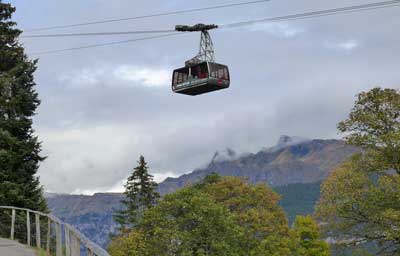
- Schilthorn
- Route: Stechelberg (Lauterbrunnen) to Schilthorn
- Train type: cable car
- Journey time: 1 hour
- 2nd Class fare: CHF108
- Supplement for Swiss Pass holders: 54
- Engelberg to Mt. Titlis cable car
- Route: Engelberg to Mt. Titlis
- Train type: cable car
- 2nd Class fare: CHF96
- Supplement for Swiss Pass holders: 46
The Swiss Travel Pass also includes free museum admission, but…
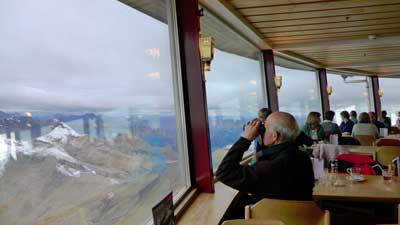
The problem is that the museums are only free on valid travel days, and almost no one would visit more than one or two museums with a Swiss Travel Pass. The trains and cable cars are so expensive that the pass gives very good value to cover those, so you don’t want to waste precious sightseeing time walking through a museum that only costs CHF10 anyway.
In other words, calculate the value of a Swiss Travel Pass on the travel savings only, and if you visit a museum here or there, then great. Most people are better off trying to squeeze in an additional train ride each day, and ignoring the museums. Switzerland is all about the outdoor scenery. As nice as the museums may be, they are not why you are there.
The pass includes free public transport in most Swiss cities
Similar to the free museum part of the offer, it’s best to ignore or minimize the value of free public transportation. It could be helpful in Zurich, but in most other Swiss tourist towns you won’t need much public transport. In fact, in Interlaken, each hotel or hostel guest automatically gets a card for free public transportation within the town (including between the two train stations).
So you might use a ride or two each day on public transport, but that won’t add up to much in terms of value of your Swiss Travel Pass.

Hi Roger – Thank you for taking the time to read through my itinerary and to provide such valuable feedback! Really appreciate it and super helpful. With your suggestions, I’ve made some changes to the itinerary as shown below. Also, we ended up booking 3 nights in Lauterbrunnen followed by 5 nights in Lucerne due to a hotel situation, so I took this into consideration as well:
1 ZRH > Lauterbrunnen (base #1 for 3 nights) > Wengen, Trummelbach/Stabbauch Falls
2 Laut > Lake Brienz + Brienz + Giessbach Falls + Ballenberg Open Air Museum OR Lake Thun scenic boat tour > Spiez > Zermatt (depending on weather) – What would you recommend prioritizing for this day?
3 Laut > Murren > Schilthorn > maybe Gimmelwald
4 Laut > Jungfraujoch > train to Lucerne (base #2 for 5 nights) in the evening
5 Lucerne > Golden Pass route to Montreux > quick stops at Lausanne & Bern > Lucerne
6 Lucerne Lake scenic boat tour > Lucerne Old Town > Stanserhorn OR maybe Mt Titlis
7 Lucerne > Mt Rigi > Mt Pilatus
8 Lucerne > quick stop in Zurich > Appenzell
Like you mentioned, we plan to keep it flexible based on fog/weather conditions, but is there anything you’d recommend adding / moving around / removing in the above plan? I understand it’s a pretty packed schedule, but our group tends to move pretty fast, and I’m excited about seeing as much as we can in our limited time.
Thank you again!!
Hello Roger!
Thanks for the informative post. Still a little confused on if I should purchase a Travel Pass or not.
My wife and I are planning an 8 day trip in Switzerland in late May. We’ve got most of our itinerary down so we may be missing a few trains here and there, but for the most part this is what travel we will need.
1 Zurich
2 Zurich > Luzern
3 Luzern
4 Luzern > Interlaken
4 Interlaken > Lauterbrunnen
5 Interlaken > Lauterbrunnen > Schilthorn (roundtrip)
6 Interlaken > Bern
7 Bern
8 Bern > Zurich
A) Would you recommend any other side trips while we are in these cities? We love walking around cities and really experiencing the culture there, but are there other stops we should make?
B) Would you recommend a Travel Pass of some sort? Or just pay as we go?
Thanks for all the advice. We can’t wait!
Ben
Ben,
I’m happy to try to help. First off I’ll recommend that you at least scan my main article on where to go in Switzerland. On an 8-day trip it might be worth spending a day in Zurich, but I can pretty much guarantee that you’ll find your other stops to be more interesting and you’ll get better deals on hotels.
On an 8-day visit to Switzerland the Swiss Travel Pass is definitely your best value. At a cost of just over US$50 per day you’ll be able to get easily more than US$100 per day use out of it and sometimes even more. For example, while in Zurich you might even do a day trip to Rhine Falls, which is about an hour from Zurich. The roundtrip train is covered and the boat tour is heavily discounted. In Lucerne/Luzern you can take the lake cruise and hop off to take the cable car up Mt. Rigi and then the train back down to complete the cruise, and it’s all covered by the Swiss Travel Pass. The Schilthorn trip is fully covered as well, and if you do those three things you’ll already pay for more than half of the pass, not to mention all the train trips you’ll take.
You should even have time to take the train to Zermatt to check out the Matterhorn on an 8-day visit.
By the way, the town of Interlaken is pleasant and worth walking through once or twice, but I’d probably just go straight to Lauterbrunnen and stay there or in one of the other nearby villages such as Gimmelwald, Murren, Wengen, or Grindelwald. Each of those is insanely photogenic and quite magical and you’ll enjoy your time there more. From Interlaken Ost train station to Lauterbrunnen it’s only a 20-minute train ride (departing every 30 minutes), so it’s really one big area.
And you might also wait to plan a trip to Bern to see how the weather is because it can be foggy at the tops of the mountains any day of the year (though usually for half a day at a time). If Schilthorn is fogged up when you are ready to go you could hop on a train to Bern for a day trip and then come back to Schilthorn in the afternoon if it clears up.
When I first visit any country I pretty much always plan on staying in the largest city for a few days and then I go elsewhere if I have time. In Switzerland the cities are all kind of generic and the scenery is perhaps the most stunning in the world, so nearly everyone enjoys the scenery more than city visits. Bern is quite nice though and it’s worth at least a day trip or even a night or two as you’ve got planned. I hope this helps and let me know if you have any other questions. -Roger
Roger:
Thanks again for the advice.
We are also considering Eurail passes. We can purchase 2nd class global senior passes for 22 consecutive days for $548 each (total $1096).
We will be using the trains a lot for day trips within the Netherlands, some in Germany, and of course in Switzerland. This seems to be a pretty good value. Do you have any thoughts?
Thanks,
Janice
Hi Roger,
Your blog post is great! I did a lot of research but could not conclude what is cheaper for my travel itinerary. Could you please help?
Below is my train travel itinerary for 3 adults in July: Bern(3N)->Lauterbrunnen(3N)->Zurich(2N)
1 ZRH > Bern
2 Bern > Lucerne > Pilatus/Titlis/Rigi > Bern
3 Bern > Zermatt > Bern (roundtrip)
4 Bern > Lauterbrunnen (one-way)
5 Lauterbrunnen > Jungfraujoch > Murren > Schilthorn > Lauterbrunnen
6 Lauterbrunnen > Wengen/Grindelwald/Gimmelwald > Thun/Spiez > Lauterbrunnen
7 Lauterbrunnen > Zurich (one-way)
8 Zurich > Vaduz, Lichtenstein > Zurich (roundtrip)
Which one is the cheapest option? Swiss Travel pass OR Swiss half fare card OR no card?
It would be great if you could give me idea of rough saving (e.g. 10% cheaper).
Thank you in advance!
Alaia,
I notice you’ve added Vaduz to the trip on this version. My advice from the other question still stands, but most people who go to Vaduz find it to be quite dull so you might want to go to Rhinefalls or Appenzell, which are both much more interesting and easier to reach. Have a great trip. -Roger
Roger:
Thank you for your prompt response and good advice – we will consider it!
I have a couple additional questions:
You mentioned the pass covering the Swiss portion of our train ride from Strasbourg. How do train ticket purchases work when traveling across country borders? We will be doing that several times – Netherlands to Germany to France to Switzerland (three weeks total).
Also, it is my understanding that train passes are not a good value in the Netherlands. Germany I’m not sure. We will only be in France two days. Do you have any advice for those countries?
Thank you again!
Janice
P.S. I also enjoyed your article about where to go in Switzerland – makes me feel good about our itinerary!
Janice,
Generally speaking, rail passes are not good value for most trips unless you’ll be on the road for a month or more and you want to make your plans as you go. One reason it’s better to buy individual tickets is that they are surprisingly cheap if you buy them at least a month or more in advance. Almost all train tickets within Europe are cheap if you buy early and the price goes up as more seats are sold. One exception to that are the domestic train tickets within Switzerland, which are the same price no matter when you buy them, and only sold one month in advance.
So your best strategy is to buy all of your train tickets at least a month or even two months in advance, except for within Switzerland. Coming from Strasbourg you’d take a train to Basel and then (almost certainly) switch to a different train for your destination within Switzerland. So you could buy a ticket from Strasbourg to Basel in advance and then use the Pass to hop on a train from Basel to wherever you want to go. The train from Strasbourg will stop first in a smaller station in the German corner of Basel and then it will stop finally in the main Basel station in Switzerland, so it’s a little confusing at first. Let me know if you have other questions. -Roger
Hi there,
I did a lot of research but could not conclude what is cheaper for my travel itinerary. Could you please help?
Below is my train travel itinerary for 3 adults: Bern(3N)->Lauterbrunnen(3N)->Zurich(2N)
1 ZRH > Bern
2 Bern > Lucerne > Pilatus/Titlis/Rigi > Bern
3 Bern > Zermatt > Bern (roundtrip)
4 Bern > Lauterbrunnen (one-way)
5 Lauterbrunnen > Jungfraujoch > Murren > Schilthorn > Lauterbrunnen
6 Lauterbrunnen > Wengen/Grindelwald/Gimmelwald > Thun/Spiez > Lauterbrunnen
7 Lauterbrunnen > Zurich (one-way)
8 Zurich > Vaduz, Lichtenstein > Zurich (roundtrip)
Which one is the cheapest option? Swiss Travel pass OR Swiss half fare card OR no card?
It would be great if you could give me idea of rough saving (e.g. 10% cheaper).
Thank you in advance!
Alaia,
Since you are staying for 8 days or so you’ll definitely save the most with a Swiss Travel Pass. The 8-day version in 2nd Class is only a bit over CHF400, so it’s only CHF50/US$50 per day. As you’ve discovered, the normal prices for trains and boats and cable cars in Switzerland is very high so with what you have on your list you’d probably be averaging well over US$100 per day per person. The Half Fare Card is often a better deal for shorter trips, but the 8-day full pass is the way to go for what you have in mind.
That said, you won’t have time to do ALL of the things on your list each of those days. Even if you are staying in Lucerne it takes about half a day to do Pilatus OR Titlis OR Rigi, and even doing two of them in one day is tough. And doing Jungfraujoch (about 6 hours) and Schilthorn (about 4 hours) on the same day is rushing a lot as well. You also have to consider that any day of the year it can be foggy at the top of the mountains. Often it’s clear in the mornings and foggy in the afternoons, although sometimes the other way around. So on some of your days you might not be able to go to the top of the mountain because you literally can’t see anything (so they shut the lifts down).
The Swiss Travel Pass covers many things fully including Schilthorn and Mt. Rigi so if you focus on those (and they are both fantastic) you’ll get the most savings out of the pass. If it’s foggy at the top of the mountain you can explore Bern or Lucerne in the towns or take a scenic train ride. Have a great trip and let me know if you have any other questions. -Roger
Hello Roger:
Thank you for the very informative article regarding the Swiss travel passes! My husband and I will be in Switzerland May 28 to June 4. This is our travel itinerary:
1. Train from Strasbourg to Bern – two nights in Bern;
2. Train from Bern to Interlaken to Wengen – three nights in Wengen;
3. Train from Wengen/Interlaken to Lucerne – two nights in Lucerne;
4. Train from Lucerne to Zurich airport.
We are trying to decide whether a Swiss travel pass would be worthwhile. We will likely not be doing the scenic train rides (or possibly one at most). Based upon your article, we are considering purchasing tickets as we go or possibly the half fare card. What is your advice?
Thank you!
Janice
Janice,
On a 2-day or 3-day visit to Switzerland it can be hard to get good value out of a Swiss Travel Pass, but on an 8-day stay like this the Swiss Travel Pass will pay for itself at least double. You can use it for the Swiss portion of your ride in from Strasbourg and of course on your train to the Zurich Airport. When you are in Wengen you can take the train back to Lauterbrunnen and then go up the Schilthorn cable car. The normal price for that would be about CHF125 (US$125) per person, and it’s fully covered by the Pass. When in Lucerne you can (and should) take the lake cruise and then get off and take the cable car up to Mt Rigi and the train back down, and all of that is fully covered as well.
There’s a cable car in Wengen itself, and a cog-wheel train to get there, and those are both covered so it will really come in handy. Since you don’t seem to have too many plans I’m sure you’ll find other great things to see and do if you have the Pass, including part of the Goldenpass or one of the other scenic train routes. The Half Fare Card is great for shorter trips because everything in Switzerland is so expensive that getting it down to half price is helpful. But for 8 days the 2nd Class Pass costs only about US$50 per day, and you can get that much value out of it before lunch every day. Let me know if you have any other questions. -Roger
Thank you Roger! We’ve decided to switch our plan on the 5th to stay in Lucerne. I didn’t realize the trains left that early.
I do have a question – is it best to get the travel pass from the SBB site, or are there other places that might have discounted prices, like some pages do for plane tickets or hotel fares?
Thank you very much!
Alexander,
I don’t believe I’ve ever seen a discount on the Swiss Travel Pass. Some Eurail Passes are discounted in November and December (AKA right now), and if the Swiss Travel Pass isn’t discounted now I don’t think it will be. It’s sold by the Swiss Rail system, which is run by the government, and that might explain the lack of discounts. Have a great trip. -Roger
Hello Roger,
I found this article while making my research about my next trip to Switzerland. It’s very complete! Thank you!
My trip is gonna happen in the end o February, and I will take my mom with me.
We’re staying 2 days in Grindelwald and 2 days in Zermatt.
So it’s gonna be Geneve – Grindelwald – Zermatt – Geneve.
I plan on going to the First on day 1 and Jungfraujoch on day 2. In Zermatt go to Matterhorn Glacier Paradise on day 1 and Gornergrat on day 2.
Considering train, transfers and tours since Geneve, would you recommend the Swiss Travel Pass or the Half-fare? Or something else?
Besides that, would you do anything different in this places? I see there are infinite combinations of tours, and would do as many as I can each day. My mom can’t walk much, but I thought these tours would be best in these places.
Thank you very much!
William Bryan
William,
I’m happy to help and I’m glad you found this useful. I think you have two great options. If you want to do the exact itinerary you have mentioned then I think you’ll love it and the Half Fare Card is probably the best option. The tricky part is that the Swiss Travel Pass only gets you a 25% discount on Jungfraujoch, which is about CHF200 (US$200) at full price, and the Swiss Travel Pass only gets you a 50% discount on Matterhorn Glacier Paradise, so paying so much more for the Pass probably won’t pay off.
The other option would be to GET the Swiss Travel Pass and then focus on the things that it covers more. The main thing is the cable car to Schilthorn, which is just across the Lauterbrunnen Valley from Jungfraujoch, is fully covered with the Swiss Travel Pass, and so are many things in the Zermatt area. Schilthorn and Jungfraujoch are both amazing (and Schilthorn is more comfortable), but with a Pass Schilthorn is covered while Jungfraujoch would cost you about US$150. With the Half Fare Card Schilthorn would cost about US$55 and Jungfraujoch about US$100. I hope this helps. Let me know if you have any other questions. -Roger
Hello Roger! Thank you for maintaining this page, and thank you for your advice about the pass. My girlfriend and I (she’s travelling from Thailand, I am from Ireland) are looking at a week in Switzerland, and here is our current plan. We won’t ever have a car so it’s all public transport:
29th we land in Zurich and stay to explore.
30th Meeting people, leave in the afternoon via train to Luzern and the Golden Pass from there to Interlaken.
31st – Schilthorn, as I just read your page and saw it’s fully covered with the pass and that makes it super appealing!
1st – Relaxation day. Maybe see the festivals in town. Also thinking Brienzer Rothorn.
2nd – No plans yet! Recommendations welcome. We love nature and food.
3rd – Meeting parents in Leukerbad. Staying overnight.
4th – back in Interlaken, going to Grindelwald to get the First mountain cable car and do stuff. We were thinking some of those zipline/cart activities, also first a hike to one of the nearby lakes I forget the name of.
5th back to Zurich since we have an early flight the next morning.
6th we leave
What do you think about this? Since everything will be done by train or bus, I feel the full 8 day travel pass is worth it.
Alexander,
I enjoy trying to help people like this, so you are welcome. You and your girlfriend are going to love Switzerland, and I’d suggest at least a scan of my other article about where to go in Switzerland. Especially since Schilthorn and Mt Rigi are fully covered by the Swiss Travel Pass, and the 8-day version is fairly cheap, I think it is your best option.
I’d also consider cutting back most or all of your time in Zurich. It’s a nice enough city and parts of it will remind you a bit of Dublin, but it’s also insanely expensive and kind of dull. Switzerland (for tourists) is all about scenery and lakes and mountain villages. Bern – the capital – is a nice and photogenic small city if you really want to check out a Swiss city. Otherwise I’d spend most or all of your time in Interlaken and Lucerne. Also, Zurich Airport is on the main train lines and the trains start running before 05:00 and are famously punctual, so if your flight is at 07:00 or later you should be able to make it from Lucerne that morning.
And if you get the Swiss Travel Pass you’ll be able to hop on almost any train or boat or cable car, so you’ll have no problem filling your days with excellent sights. The trains in Switzerland are the nicest in Europe and they are always on time, so I strongly prefer them to a car. I hope this helps. Let me know if you have any other questions. -Roger